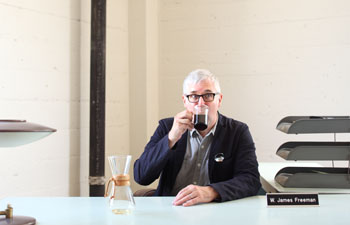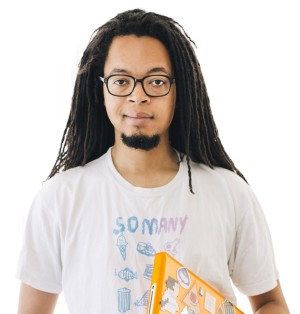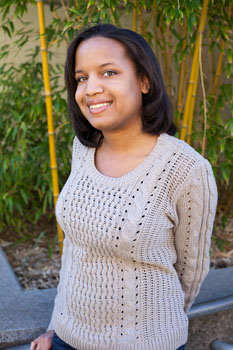The popular True Originals notable alumni speaker series returns with an artisan coffee innovator, and two creative Slugs who are setting bold new standards in the world of video games.
The True Originals talks will be a highlight of Alumni Weekend, which runs from April 28–May 1.
The renowned coffee impresario and Blue Bottle Coffee founder James Freeman (Stevenson '90, philosophy) will sit down for a one-on-one interview with UC Santa Cruz Philosophy Department Chair Daniel Guevara at 10 a.m. on Saturday, April 30, at Oakes College.
And, in case you’re wondering what philosophy has to do with Freeman’s inspiration and career success, the answer is: everything.
At 11:15 a.m. at the same venue, following the Freeman-Guevara talk, edgy computer game designers Akira Thompson (M.S. ’15, games and playable media) and Lauren Scott (Porter ‘14, business management economics/computer science) will talk about making their marks in the gaming world by staying true to their creative vision and their social consciousness.
Grounds for inspiration
Blue Bottle started in 2002 as a one-man operation. Freeman was so strapped for funds that he paid the designer of the famous Blue Bottle logo in coffee beans. At a time when coffee was largely considered, in his own words, a “mechanism to stay awake,” he had a bold, exacting approach to specialty coffee making that has won him legions of fans worldwide.
But his beginnings were humble to say the least. Just to get the business off the ground, Freeman took a risk and kicked in $20,000 in savings, draining his bank account, and added additional funds from his credit cards. In all, he was in for $40,000. If he’d thought too much about what he was doing, perhaps he would have scratched the entire plan before Blue Bottle had a chance to take shape.
“I was unhampered by knowledge of business,” Freeman said. “I thought I could do it, so I did it. Somehow, the more you know, the more risk avoidant you become, (and) the more knowledge weighs you down.’’
Aside from his beginner’s mind regarding business practices, Freeman had a bedrock of idealism, which comes from his experience as a philosophy major at UC Santa Cruz.
“At the time, the philosophy department didn’t even have a graduate degree,” Freeman said. “After the Intro class, basically everything was taught by full professors, and most of the classes were seminar style. There was a real purity to studying this way, the clarity of expression that was expected. I learned a lot about writing, learned a lot about language. That was very inspiring to me. I still think about those days sometimes.”
Blue Bottle now has 25 stores, including three in Tokyo, and more than 600 employees.
Changing the world, one game at a time
Akira Thompson recently remarked about the “particular ability” of games to foster “empathetic experiences.”
Two of his recent games take on subjects including racism and greed. “We create a virtual space which is safer than the real world but is a place where you can explore from a perspective that you couldn’t before and see things first hand.”
Thompson, an Iraq veteran, has packed in a lot of living, thinking, and designing for someone in his early 30s. He has already made an appearance on the Forbes list of “30 under 30.” He is at the helm of his own independent game company. And Thompson has been drawing a lot of attention for &maybetheywontkillyou, a live game in which the player takes on the role of a poor black American attempting to go to the corner store down the street and return home safely.
He founded the social art creative firm RainBros, which developed a game with socio-political overtones called Stop! Thief!
Lauren Scott, who will appear alongside Thompson, is part of the new wave of button-pushing female video game designers. After graduating from UC Santa Cruz, she went to work at Zynga as an associate game designer. After a year there, she went to work at Hangar 13, a 2K Games studio, where she is working on Mafia 3, a “third-person shooter” game with an organized crime theme.
“I’ve always been fascinated by systems and by the way games can tell stories,” Scott said. “You can abstract out a lot of really complex ideas and thoughts and experience them first hand in ways that would be impossible in any other medium. That is the main thing that draws me to game design.”
For Scott, her UC Santa Cruz years were a time for the students “to always be inquisitive, and always pushing boundaries, pushing the medium to its limits to see what it could explore and express.”





